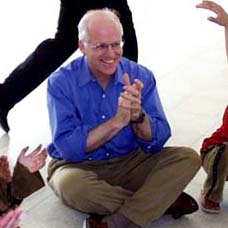2006.09.02: September 2, 2006: Headlines: Crime: DNA: Justice: Chicago Tribune: A federal judge ruled this week that Jerry Mark, a former Peace Corps volunteer and self-described hippie lawyer, was denied a fair trial because prosecutors and the trial judge withheld key evidence that could have proven Mark's innocence
Peace Corps Online:
Peace Corps News:
Library:
Peace Corps: Crime :
Crime and the Peace Corps:
April 11, 2005: Headlines: Crime: DNA: Justice: Chicago Tribune: DNA undercuts verdict against RPCV Jerry Marks in infamous Iowa murder case :
2006.09.02: September 2, 2006: Headlines: Crime: DNA: Justice: Chicago Tribune: A federal judge ruled this week that Jerry Mark, a former Peace Corps volunteer and self-described hippie lawyer, was denied a fair trial because prosecutors and the trial judge withheld key evidence that could have proven Mark's innocence
A federal judge ruled this week that Jerry Mark, a former Peace Corps volunteer and self-described hippie lawyer, was denied a fair trial because prosecutors and the trial judge withheld key evidence that could have proven Mark's innocence

The evidence included testimony from eyewitnesses that suggested Mark was hundreds of miles away when his brother, Les Mark, and his family were slain in the farmhouse that had been passed down for generations. In some instances, prosecutors hid the identity of people who contradicted their witnesses, according to the ruling.
A federal judge ruled this week that Jerry Mark, a former Peace Corps volunteer and self-described hippie lawyer, was denied a fair trial because prosecutors and the trial judge withheld key evidence that could have proven Mark's innocence
Judge: Cain and Abel murder trial unfair
Iowa prosecutors hid facts in '75 slayings, federal jurist rules
By Flynn McRoberts and Maurice Possley
Tribune staff reporters
Published September 2, 2006
Caption: Jerry Mark is shown testifying during a hearing in 1994 on whether to grant him a new murder trial. The motion was denied. At left is Senior Judge L.D. Lybbert. Courier File Photo
A federal judge has ordered Iowa authorities to retry or release a man convicted of one of the most notorious slayings in the state's history--the murder of a Cedar Falls farmer, his wife and two young children more than 30 years ago.
The judge ruled this week that Jerry Mark, a former Peace Corps volunteer and self-described hippie lawyer, was denied a fair trial because prosecutors and the trial judge withheld key evidence that could have proven Mark's innocence.
The evidence included testimony from eyewitnesses that suggested Mark was hundreds of miles away when his brother, Les Mark, and his family were slain in the farmhouse that had been passed down for generations. In some instances, prosecutors hid the identity of people who contradicted their witnesses, according to the ruling.
Senior U.S. District Judge Donald O'Brien found that the failure of the state to turn over more than 50 pages of investigative reports was a "gross" and "flagrant" violation of the prosecutors' duties.
"This court is not ruling that Mark is not guilty of the crimes," O'Brien wrote, "only that in a careful detailed review of the cumulative effect of all the evidence that was not disclosed, Mark did not receive a fair trial."
He was convicted in 1976 and sentenced to life in prison for the gunshot slayings, in which Les and Jorjean Mark's 5-year-old daughter and 18-month-old son were both shot in the chest and head. Prosecutors invoked the biblical brothers Cain and Abel, contending at Jerry Mark's trial that he had told a friend: "My little brother screwed me out of my farm."
Dorothy Mark, who found the bodies of her younger son and his family at dawn on Nov. 1, 1975, said in an interview that she had been expecting a favorable ruling. "We were sure that Jerry was innocent," said Mark, who heard news of the ruling when her surviving son called from prison Thursday night. "We thought the judge, when he studied the case, he would rule in Jerry's favor."
Prosecutors to appeal
The Iowa attorney general's office, which is handling the case for the state, said it would appeal the decision to the 8th U.S. Circuit Court of Appeals. "We are disappointed in the decision," said Bob Brammer, spokesman for the attorney general's office. "Mark will remain in prison . . . during any appeal."
David Dutton, Mark's trial prosecutor who now is in private practice, declined to comment, saying he was "ethically prohibited from commenting on a matter in litigation."
The case against Mark was circumstantial. It featured eyewitness testimony supporting the theory that he had driven his motorcycle from his home in California to the farm, committed the murders, then fled.
Mark admitted going on a road trip, but contended he never reached Cedar Falls. In granting a new trial, O'Brien ruled that prosecutors and the judge never gave Mark's lawyers reports of witnesses who supported his account. Some of those witnesses told authorities they saw Mark hundreds of miles west, traveling toward the crime scene after the murders.
One of them, Jean Doyle, "would have been an important witness for Mark as she would have testified that she saw him arriving from the west, and traveling east, and she witnessed all of this on Saturday morning, Nov. 1, after the murders had occurred 540 miles away."
Mark's co-counsel in his appeals, Jim Cleary, agreed that various witnesses support his client's alibi, including a waitress in western Nebraska who said she saw him a few hours after the murders. "If he was in North Platte, Neb., on Saturday morning, it would've been physically impossible for him to be [at the farm] at the time the crimes were committed," Cleary said.
Among the other withheld reports were those that undermined state witnesses, including one person whose memory had been impaired by the removal of a brain tumor 10 years before the crime. Other reports included widely different descriptions of the clothes Mark was wearing while allegedly fleeing on his Honda motorcycle. "You cannot get that many sets of clothes into this motorcycle. To not turn over these exhibits was a violation," the judge wrote.
Defense attorneys also never saw a report that cast doubt on a prosecution claim that a shoe print found at the crime scene was left by Mark.
Less forensic evidence
The case against Mark also rested on forensic evidence that has since been overturned or otherwise called into doubt. So if the case is retried, prosecutors will have far less forensic evidence to present.
For instance, at the original trial, the state said blood typing tests found that saliva on a cigarette butt inside the farmhouse matched Mark's blood type, O. But subsequent, more precise DNA tests two years ago definitively excluded Mark.
Prosecutors also used a technique that compared bullet lead at the scene to lead in bullets purchased by Mark. The process, known as comparative bullet lead analysis, has been found to be flawed and unreliable.
The case has long been contentious. During a postconviction hearing, one of Mark's trial attorneys testified that obtaining information from the prosecution "was like tooth and nail. You couldn't get anything out of them," according to O'Brien's ruling. "Nobody volunteered anything."
At the same time, prosecutors repeatedly have contended they acted properly and turned over everything required of them. But O'Brien was unconvinced. He said those claims were "self-serving" and that the evidence showed something else.
"They did not actually do what they swear they did," he wrote.
----------
fmcroberts@tribune.com
mpossley@tribune.com
Copyright © 2006, Chicago Tribune
When this story was posted in September 2006, this was on the front page of PCOL:





Peace Corps Online The Independent News Forum serving Returned Peace Corps Volunteers
 | Chris Shays Shifts to Favor an Iraq Timetable
In a policy shift, RPCV Congressman Chris Shays, long a staunch advocate of the Bush administration's position in Iraq, is now proposing a timetable for a withdrawal of American troops. How Mr. Shays came to this change of heart is, he says, a matter of a newfound substantive belief that Iraqis need to be prodded into taking greater control of their own destiny under the country’s newly formed government. As Chairman of the House Government Reform subcommittee on national security, he plans to draft a timetable for a phased withdrawal and then push for its adoption. A conscientious objector during the Vietnam War who said that if drafted he would not serve, Chris Shays has made 14 trips to Iraq and was the first Congressman to enter the country after the war - against the wishes of the Department of Defense. |
 | Peace Corps' Screening and Medical Clearance
The purpose of Peace Corps' screening and medical clearance process is to ensure safe accommodation for applicants and minimize undue risk exposure for volunteers to allow PCVS to complete their service without compromising their entry health status. To further these goals, PCOL has obtained a copy of the Peace Corps Screening Guidelines Manual through the Freedom of Information Act (FOIA) and has posted it in the "Peace Corps Library." Applicants and Medical Professionals (especially those who have already served as volunteers) are urged to review the guidelines and leave their comments and suggestions. Then read the story of one RPCV's journey through medical screening and his suggestions for changes to the process. |
 | Gates charity races to spend billions
Warren E. Buffett’s gift of $31 billion to the Bill and Melinda Gates Foundation means that for tax reasons, starting in 2009, the foundation must distribute $3 billion annually, or a little more than twice what it distributed last year.
PCOL Comment: The Foundation says that "preventing the spread of HIV is the most durable long-term solution to the AIDS epidemic, and a top priority for the foundation." Peace Corps Volunteers and Returned Volunteers have been doing just that in AIDS Education for the past 15 years. Why not consider a $100M annual contribution to the Peace Corps to put 2,500 additional volunteers in the field to expand AIDS education worldwide? |
 | The Peace Corps is "fashionable" again
The LA Times says that "the Peace Corps is booming again and "It's hard to know exactly what's behind the resurgence." PCOL Comment: Since the founding of the Peace Corps 45 years ago, Americans have answered Kennedy's call: "Ask not what your country can do for you--ask what you can do for your country. My fellow citizens of the world: ask not what America will do for you, but what together we can do for the freedom of man." Over 182,000 have served. Another 200,000 have applied and been unable to serve because of lack of Congressional funding. The Peace Corps has never gone out of fashion. It's Congress that hasn't been keeping pace. |
 | Changing the Face of Hunger
In his new book, Former Congressman Tony Hall (RPCV Thailand) says humanitarian aid is the most potent weapon the United States can deploy against terrorism. An evangelical Christian, he is a big believer in faith-based organizations in the fight against hunger. Members of Congress have recently recommended that Hall be appointed special envoy to Sudan to focus on ending the genocide in Darfur. |
 | PC will not return to East Timor in 2006
Volunteers serving in East Timor have safely left the country as a result of the recent civil unrest and government instability. Latest: The Peace Corps has informed us that at this time, the Peace Corps has no plans to re-enter the country in 2006. The Peace Corps recently sent a letter offering eligible volunteers the opportunity to reinstate their service in another country. |
 | Chris Dodd considers run for the White House
Senator Chris Dodd plans to spend the next six to eight months raising money and reaching out to Democrats around the country to gauge his viability as a candidate. Just how far Dodd can go depends largely on his ability to reach Democrats looking for an alternative to Hillary Clinton. PCOL Comment: Dodd served as a Volunteer in the Dominican Republic and has been one of the strongest supporters of the Peace Corps in Congress. |
 | Peace Corps stonewalls on FOIA request
The Ashland Daily Tidings reports that Peace Corps has blocked their request for information on the Volkart case. "After the Tidings requested information pertaining to why Volkart was denied the position — on March 2 — the newspaper received a letter from the Peace Corps FOIA officer stating the requested information was protected under an exemption of the act." The Dayton Daily News had similar problems with FOIA requests for their award winning series on Volunteer Safety and Security. |
 | PCOL readership increases 100%
Monthly readership on "Peace Corps Online" has increased in the past twelve months to 350,000 visitors - over eleven thousand every day - a 100% increase since this time last year. Thanks again, RPCVs and Friends of the Peace Corps, for making PCOL your source of information for the Peace Corps community. And thanks for supporting the Peace Corps Library and History of the Peace Corps. Stay tuned, the best is yet to come. |
 | History of the Peace Corps
PCOL is proud to announce that Phase One of the "History of the Peace Corps" is now available online. This installment includes over 5,000 pages of primary source documents from the archives of the Peace Corps including every issue of "Peace Corps News," "Peace Corps Times," "Peace Corps Volunteer," "Action Update," and every annual report of the Peace Corps to Congress since 1961. "Ask Not" is an ongoing project. Read how you can help. |
 | RPCV admits to abuse while in Peace Corps
Timothy Ronald Obert has pleaded guilty to sexually abusing a minor in Costa Rica while serving there as a Peace Corps volunteer. "The Peace Corps has a zero tolerance policy for misconduct that violates the law or standards of conduct established by the Peace Corps," said Peace Corps Director Gaddi H. Vasquez. Could inadequate screening have been partly to blame? Mr. Obert's resume, which he had submitted to the Peace Corps in support of his application to become a Peace Corps Volunteer, showed that he had repeatedly sought and obtained positions working with underprivileged children. Read what RPCVs have to say about this case. |
 | Why blurring the lines puts PCVs in danger
When the National Call to Service legislation was amended to include Peace Corps in December of 2002, this country had not yet invaded Iraq and was not in prolonged military engagement in the Middle East, as it is now. Read the story of how one volunteer spent three years in captivity from 1976 to 1980 as the hostage of a insurrection group in Colombia in Joanne Marie Roll's op-ed on why this legislation may put soldier/PCVs in the same kind of danger. Latest: Read the ongoing dialog on the subject. |
Read the stories and leave your comments.

Some postings on Peace Corps Online are provided to the individual members of this group without permission of the copyright owner for the non-profit purposes of criticism, comment, education, scholarship, and research under the "Fair Use" provisions of U.S. Government copyright laws and they may not be distributed further without permission of the copyright owner. Peace Corps Online does not vouch for the accuracy of the content of the postings, which is the sole responsibility of the copyright holder.
Story Source: Chicago Tribune
This story has been posted in the following forums: : Headlines; Crime; DNA; Justice
PCOL34327
19
|
By gloria pinto (136.145.60.22) on Wednesday, January 10, 2007 - 4:19 pm: Edit Post |
hola,
Mucho agradecere si guardan en archivo la pelicula, que prepare sobre mi servicio en Brazil. Año 1962-1963.
Servi de voluntaria Brazil 1 la pelicula se titula Gates of life. Les dejo mi dirección Postal. Box 5086 Aguadilla P.R. 00605























